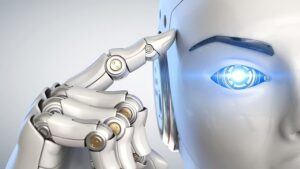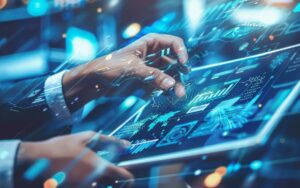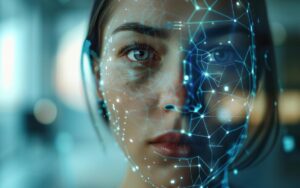For better or worse, artificial intelligence is turning up in every area of our lives, especially in the workplace. Although many organizations use AI in customer relations and product development, the technology can also be used internally in human resources (HR) departments.
This article showcases the role of artificial intelligence in human resources. We will define AI and show how AI is used in human resources, the benefits and drawbacks of AI in HR, how to deploy it, and the future of AI in human resources management. We’ll also share how to gain the skills required to apply AI in HR through a comprehensive AI and machine learning bootcamp.
Let’s start with the fundamentals: what is artificial intelligence?
What is AI?
Artificial intelligence (or AI for short) refers to the field of development that makes computer systems think like people, allowing machines or software to perform tasks that typically require human intelligence. This field includes capabilities like learning, problem-solving, reasoning, and understanding natural language.
So, artificial intelligence is the science of making software and machines that imitate human thought. With that out of the way, let’s see the role of AI in human resources.
Also Read: Leveraging Machine Learning and AI in Finance: Applications and Use Cases
The Ways AI is Used in Human Resources
Here are eight ways we see artificial intelligence in human resources.
- Recruiting/Hiring. Hiring new employees can be a stressful, time-consuming, hit-or-miss proposition. Fortunately, AI-driven processes can sift through countless resumes, analyze their contents, and link them to potential job openings. AI can even help evaluate, conduct personality assessments, pull video interview insights, and more.
- Onboarding/Offboarding. Whether a company brings a new hire on board or lets someone go, specific protocols must be followed. These protocols typically involve completing a lot of paperwork and following set procedures. An AI-driven onboarding platform can guide the new hire through every process step, including scheduling training sessions and introducing them to company policies. Similarly, that same AI system can handle exit surveys, accounting for returned company property, and other offboarding tasks.
- Employee performance reviews. Reviews are potentially time-consuming and subjective, so having AI-enhanced software that can track and analyze employee performance makes the entire process easier, faster, and more accurate. AI systems keep track of peer feedback, finished tasks, project involvement, and other factors.
- Monitoring. Large workforces can get unwieldy and difficult to keep track of. AI-based employee monitoring software can help HR departments keep track of online movements, identifying bottlenecks in employee productivity. This monitoring also spots company policy violations or other anomalies.
- Training and talent development. Ideally, every professional should be able to grow their skills and acquire new ones. AI can personalize an employee’s training and talent development, analyzing the latter’s skills and career goals and recommending suitable webinars, training courses, and workshops.
- Workforce planning. HR departments need to ensure that they have the right mix of employees, with all roles being filled and no redundancies. AI tools can analyze data such as industry trends, company growth plans, and current workforce skills to spot gaps and opportunities in hiring plans, showing which roles should be filled in the future.
- Employee engagement initiatives. AI-powered survey engines can automate the process of gauging employee sentiment and uncovering areas of concern and possible trends. HR teams can draw insights from these results and create practical initiatives that improve employee morale, engagement, and satisfaction.
- Virtual assistants and HR chatbots. Sometimes, employees can’t reach anyone when they have a human resource-related question. It could be after business hours, for example. However, AI chatbots can serve as 24/7 HR assistants, allowing employees to ask about leave policies, time off, benefits, etc. Also, HR chatbots free up the HR team to focus on strategic tasks while employees can get answers to their questions.
The Advantages and Disadvantages of Employing AI in Human Resource Management
Artificial intelligence comes with its upsides and downsides. Let’s look at the pros and cons of HR AI.
Pros of HR AI
- It frees HR professionals from repetitive, monotonous tasks. It allows them to dedicate more time and effort to tasks that require greater human involvement, such as advancing organizational strategies and building better, closer relationships with candidates
- It improves candidate screening and selection
- It increases accuracy and efficiency in the performance of administrative tasks
- It improves employee retention and engagement by offering real-time feedback and personalized experiences
- It streamlines and personalizes learning and development initiatives
- It analyzes data and presents it to HR departments to make better-informed decisions
- It cuts bias in the screening process
- It uses routine task automation to increase productivity
- It helps organizations comply with regulations and labor laws
Cons of AI in HR
- AI-driven solutions typically come with high startup and maintenance costs
- AI’s digital assets are potentially vulnerable to data breaches and other cybersecurity risks
- If the technology somehow fails, the process can be open to disruption
- The software is only as effective as the quality of its algorithms, so HR professionals must acquire a solid understanding of algorithms, ensuring that they are free of bias and preventable errors
Also Read: Machine Learning in Healthcare: Applications, Use Cases, and Careers
How to Deploy Artificial Intelligence in Human Resources
When an organization deploys HR AI, it must be handled carefully, as with any other new technology. Some factors that should be considered include:
- Obtaining reliable data sets. Real-time and accurate data is vital for successful AI results. The data must be objective and all-encompassing. Therefore, the first in AI deployment is to gather the required data, and then define the output-driven goal.
- Using the correct HR AI implementation. The AI environment is unique from other IT environments, requiring specialized procedures and skills for successful implementation. HR and IT professionals should ensure they are clear about assembling the correct data sources and then cleaning and curating the information.
- Having a clear understanding. It is essential to understand the ideas to be driven. Therefore, there should be clarity and instruction on the appropriate patterns to be examined and acted on.
- Removing bias. This final step involves the AI using the algorithms and logic entered into the system to produce accurate and impartial outcomes. The appropriate staff must ensure that the data is accurate. Remember: the AI will only do what you want and have trained it to do, not make your final decisions for you.
The Future of AI in Human Resource Management
According to this paper released by the McKinsey Global Institute, artificial intelligence will create over $13 trillion in global economic activity, so that AI will be around for a while in the foreseeable future. As AI’s capabilities grow, expect greater personalization, automation, and data-driven decision-making.
And although there are some reasonable concerns about AI eliminating some jobs, there will be new positions to fill the void. Specifically in HR, we expect to see careers such as AI ethics officers.
Would You Like More Artificial Intelligence Skills?
Since artificial intelligence appears to be the future wave, acquiring the right skills and understanding to thrive in this exciting new environment is essential. That’s why you should consider this post graduate program in AI and machine learning.
This high-engagement online bootcamp offers training in machine learning, artificial intelligence, natural language processing, and more, using virtual classes and over two dozen hands-on projects.
According to Glassdoor.com, AI engineers can make an annual average of $128,056, going as high as $194K. Check out this AI bootcamp and prepare your skillset for the future challenges of artificial intelligence.
FAQ
Q: How is AI used in HR?
A: HR AI is used for:
- Recruiting and hiring
- Onboarding and offboarding
- Performance reviews
- Employee monitoring
- Training and talent development
- Virtual assistants and chatbots
- Workforce planning
- Employee engagement initiative
Q: How can AI help in human resource management?
A: AI helps HR professionals save time and reduce costs in many ways. For instance, AI-based tools and applications can automate repetitive, tedious tasks like resume screening, candidate matching, interview scheduling, and more. AI doesn’t necessarily mean the HR staff will be reduced. Instead, with less time spent on these mundane tasks, HR staff are freed up to handle more complex and exciting tasks.
Q: Can AI take over human resources?
A: Artificial intelligence cannot replace the human element. As mentioned above, AI can tackle the drudge work generally associated with HR, while the human staff tackles the more demanding items that require a more nuanced human touch.
Q: Can AI be used in performance reviews?
A: Yes. Artificial intelligence can track and analyze employee data all year, then provide comprehensive reports highlighting individual strengths, noting areas that need improvement, and measuring employee progress over time. Thus, AI’s objectivity can ensure fairer employee evaluations.
Q: Does AI have a solid potential future in human resources?
A: Absolutely. Human resources is critical to any organization, and AI’s increasing capabilities can ensure greater efficiency, flexibility, accuracy, and objectivity.
You might also like to read:
Machine Learning Interview Questions & Answers
How to Become an AI Architect: A Beginner’s Guide
How to Become a Robotics Engineer? A Comprehensive Guide






